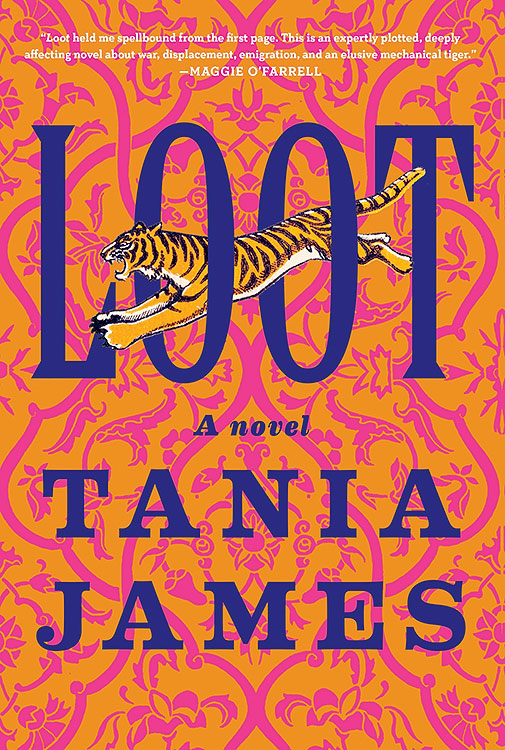Loot, the ambitious third novel from Tania James ’06SOA, charts the sprawling fictional journey of an actual historical artifact across two centuries (eighteenth and nineteenth), eight different narrative perspectives (from an Indian sultan to a British seaman), and four geographic backdrops (India, the open seas, France, and England). These elements keep Loot amply supplied with colorful characters and elaborate, page-turner plots (translation: this novel is fun to read), but they also enable James to accomplish something much rarer: a fresh, genuinely inclusive look at the myriad ways that European colonialism affected people from all walks of life.
The action begins in 1794 in India’s Mysore kingdom, where the sovereignty of its ruler, Tipu Sultan, has been rattled by recent skirmishes with the English. As part of the peace treaty brokered with the British commander Lord Cornwallis, two of Tipu’s sons have been held hostage, as collateral against the possibility that Tipu will renege on the treaty’s terms. Now, thanks to the sultan’s vigilance, his sons are being returned, and he wants to bestow on them a “gift of such grandeur and ferocity that it will silence all memory of the boys’ exile.”
Abbas, a local Muslim boy of seventeen, is a talented wood carver who has made elaborate toys for one of the sultan’s consorts. But he is shocked to learn that the sultan has chosen him to work with Lucien Du Leze, an exiled French clockmaker in the sultan’s court, to build a life-size wooden version of a bronze rifle ornament depicting a tiger devouring a European (“I want the teeth planted in the neck of the infidel,” Tipu commands). This creation will be a “great moving toy” — an automaton that also plays music. Abbas and Du Leze have exactly six weeks to make it.
The sultan is so pleased by the finished product that he flashes a rare grin at the public unveiling (though his newly freed sons seem more interested in securing the British sweets they enjoyed in captivity than in the wondrous toy). But inevitably, another war with England breaks out, and this time Tipu goes into battle and is killed on the field. Abbas also joins the fight but survives by feigning death atop a corpse. The automaton, “Tipu’s Tiger,” becomes a spoil of war, seized by the victors and destined for their homeland.
From this point on, the fate of Tipu’s Tiger becomes the driving force of James’s increasingly picaresque narrative. Abbas is obsessed with finding the automaton, his finest achievement. He sets sail for France, first aboard an East India Company cargo ship — a riveting, heartbreaking interlude conveyed through the diary of a soulful English seaman who befriends Abbas — then as a captive on a French pirate ship. Arriving finally at Du Leze’s clock shop in Rouen, Abbas discovers that his mentor has died and the shop is now being run by Jehanne, an Indian-French girl he knew in Mysore.
Jehanne joins Abbas’s quest to find and reclaim the automaton, and the two hatch a scheme that takes them to Cloverpoint Castle, one of England’s grand country houses, occupied by two of the novel’s most vibrant characters — Lady Selwyn, a spirited English widow whose titled husband has died of dysentery in India, and Rum, the lord’s former aide-de-camp who is now Lady Selwyn’s land agent and secret on-call lover. (Rum’s rhapsodic appreciation of his seventy-two-year-old paramour’s sexiness is one of the novel’s great treats.)
After some plot twists that are as unpredictable as they are compelling, Rum finds himself on his way to Rouen, alone. Stopping at an inn in Canterbury, he is asked by an Englishman where he is from. When Rum says India, the man asks, “So what brings you to England from all the way over there?” Rum is tempted to respond with a phrase that, in an introductory note, James attributes to the British–Sri Lankan activist and writer Ambalavaner Sivanandan: “I am here because you were there.”
Rum holds his tongue and settles for a simple description of his job at Cloverpoint Castle, but that powerfully eloquent unspoken answer reverberates through every page of this endlessly inventive novel. Indeed, it could be voiced most aptly by Tipu’s Tiger itself, currently on display in London’s Victoria and Albert Museum.
The painful paradox of the automaton’s real-life fate is at the heart of James’s achievement here. While she never breaches the temporal bounds she has set for her story, it is nonetheless infused with a twenty-first-century acuity, particularly in relation to such themes as the evils of colonialism, the dilemma of whether to return plundered cultural treasures, the irrationality of class systems and racial and religious animus, and the tragedy of entrenched homophobia and misogyny across cultures. Amid this banquet of food for thought, Loot delivers a good old-fashioned yarn full of intrigue, adventure, romance, and surprises.



